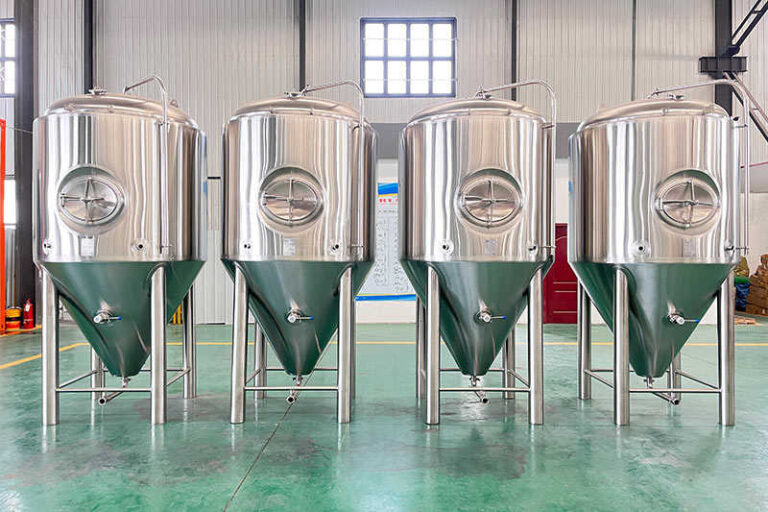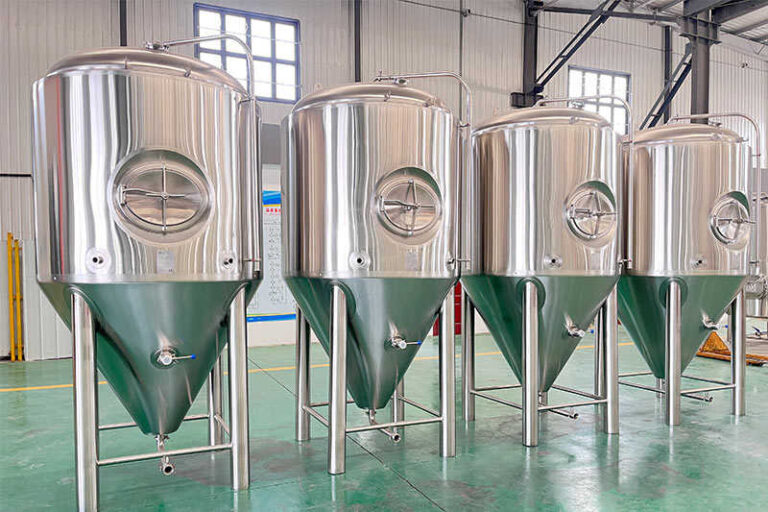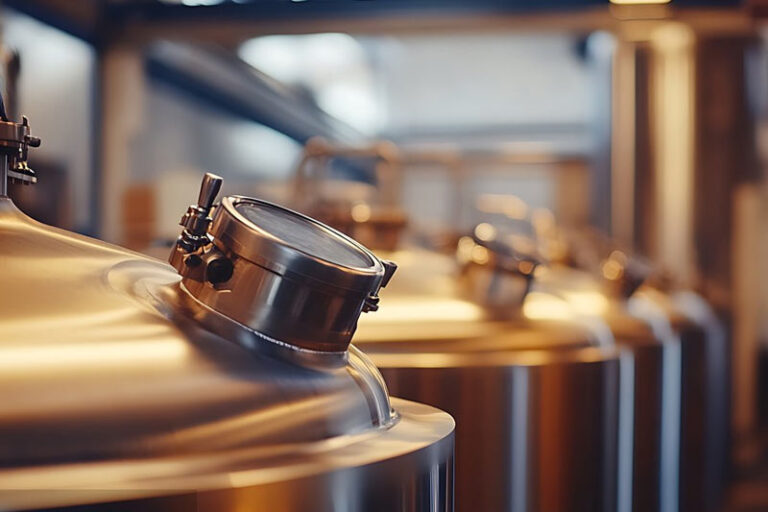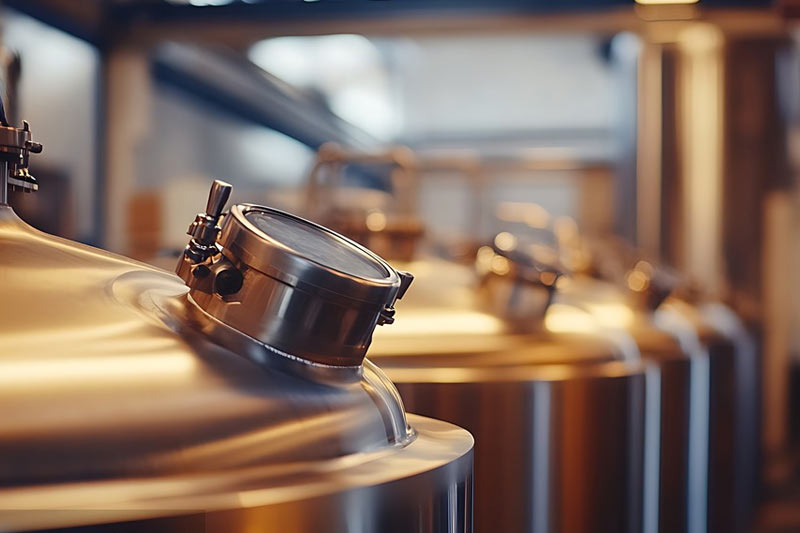In the world of winemaking and other fermentation processes, fermentation vessels play a vital role. Whether you are a home brewer or a commercial brewery, the correct selection and use of a fermentation vessel has a direct impact on the quality, flavor, and stability of the final product. This article will take a deep dive into the main purpose of a fermentation vessel and its importance to the brewing process, including its function, material selection, temperature control, and impact on the flavor of the brew.
Basic Concepts of Fermentation
Before we delve into the purpose of fermentation vessels, we first need to clarify the basic concepts of fermentation. Fermentation is a biochemical process, usually catalyzed by yeast, bacteria, or other microorganisms. In this process, yeast converts sugar into alcohol and carbon dioxide, while producing various flavor and aroma compounds. In winemaking, fermentation is not only the process of producing alcohol but also a key link in giving the wine a unique flavor and taste.
Fermentation is divided into several stages, including:
- Primary fermentation: In this stage, yeast begins to proliferate rapidly, consumes available sugars, and produces alcohol and carbon dioxide.
- Stable fermentation: As sugar decreases, yeast activity begins to slow down and the fermentation rate decreases.
- Secondary fermentation: Usually carried out after primary fermentation, the wine is transferred to remove sediment, thereby improving clarity and taste.

Types of fermentation vessels
Open fermentation tanks
Open fermentation tanks are often used for small-scale brewing, especially in traditional beer brewing.
- Advantages: Open tanks allow yeast to breathe freely, which is suitable for beers that require high-temperature fermentation, such as some Belgian beers. Gas can be easily discharged, reducing pressure.
- Disadvantages: It is susceptible to environmental pollution, and the entry of external microorganisms must be carefully controlled, and the temperature and oxygen control requirements are high.
Closed fermentation tanks
Closed fermentation tanks are the most commonly used containers in modern brewing. They are usually cylindrical with a sealed lid and air valve.
- Advantages: Effectively prevents the entry of oxygen and pollutants, suitable for beers that require long fermentation. Through pressure control, brewers can adjust the performance of yeast to obtain a more ideal flavor.
- Disadvantages: Relatively complex, beginners may need some time to familiarize themselves with the use and maintenance of the equipment.
Plastic fermentation barrels
Plastic fermentation barrels are usually lighter and suitable for home brewing.
- Advantages: Economical, easy to move, and clean. The transparent design makes it easy to observe the fermentation process.
- Disadvantages: Plastic may absorb certain odors, and long-term use may affect the taste of beer.
Glass bottles
Commonly used for small-batch brewing, especially home brewing.
- Advantages: not easy to react with liquids, can effectively prevent oxidation, and the transparent bottle is easy to observe.
- Disadvantages: easy to break, and limited capacity, suitable for small-scale brewing.
Stainless steel fermentation tanks
Stainless steel fermentation tanks are the mainstream choice for modern brewing and have excellent corrosion resistance.
- Advantages: easy to clean and maintain, can withstand high temperature and high pressure, suitable for commercial-scale brewing.
- Disadvantages: high price and large initial investment.

The main purpose of the fermentation vessel
Provide a suitable fermentation environment
The primary purpose of the fermentation vessel is to provide a suitable fermentation environment for the yeast. This includes controlling the temperature, humidity, and oxygen content to ensure that the yeast can work in an optimal state. Yeast is very sensitive to environmental conditions. Too high or too low a temperature will affect its activity, which in turn affects the efficiency of fermentation and the quality of the final product.
Prevent contamination
The design of the fermentation vessel should ensure that external contaminants are prevented from entering. Open containers are easily contaminated by microorganisms in the air, which may cause fermentation failure or produce unpleasant flavors. The closed container has a sealed design that effectively reduces the risk of contamination and protects the purity of the brewing.
Control the release of fermentation gases
During the fermentation process, yeast produces carbon dioxide. The fermentation vessel needs to have a certain degree of ventilation to allow carbon dioxide to escape safely, but at the same time, it cannot let outside air in. Many modern fermenters are equipped with air valves, which are specially designed to release gases without letting air and impurities in.
Promote the development of flavor
The material and design of the fermentation vessel can affect the flavor of beer or other fermented beverages. For example, stainless steel containers can maintain the pure flavor of the beverage, while wooden barrels can give the body a unique aroma and flavor component. When choosing a fermentation vessel, brewers need to consider its potential impact on the flavor of the final product.
Easy to Clean and Maintain
The fermentation vessel needs to be easy to clean and sanitize to prevent the growth of bacteria and impurities. Any residue or dirt may affect the fermentation process and the quality of the final product. Therefore, it is crucial to choose vessels that are well-designed and easy to access for cleaning.
Support for Temperature Control
Some fermentation vessels are equipped with built-in temperature control systems to maintain a constant fermentation temperature. Proper temperature control is essential for yeast activity and fermentation results. Especially when brewing a specific style of beer, small temperature changes can lead to significant differences in flavor.

Factors to consider when choosing a fermentation container
- Container material: Material is the primary consideration when choosing a fermentation container. Containers made of different materials differ in terms of cleaning, durability, and flavor impact. Common materials include stainless steel, glass, plastic, and wood, each with its advantages and disadvantages.
- Capacity selection: The capacity of the container should match the scale of brewing. For home brewers, choosing a small container can facilitate operation, while commercial brewing requires large tanks to meet production needs.
- Temperature control function: Some fermentation containers are equipped with built-in temperature control systems, which are suitable for brewing processes with strict temperature requirements. Choosing suitable temperature control equipment can effectively improve brewing efficiency and the quality of the final product.
- Cleaning and maintenance: Fermentation containers should be easy to clean and disinfect to prevent bacterial growth and affect fermentation quality. Choosing containers with reasonable design and easy disassembly can reduce the difficulty of cleaning.
- Cost factor: Budget is a factor that cannot be ignored when choosing a fermentation container. According to personal or commercial needs, choose a cost-effective container while ensuring that it does not affect the quality of brewing.
FAQ
What is the main purpose of a fermentation vessel?
The main purpose of a fermentation vessel is to provide a suitable environment for yeast to ferment, and ensure that sugars are converted into alcohol and carbon dioxide while preventing contamination, controlling temperature, and promoting the development of flavor.
Why is the material of the fermentation vessel important?
Containers made of different materials have different effects on the flavor, cleanliness, and durability of the wine. For example, stainless steel containers are corrosion-resistant and easy to clean, while wooden barrels can give the wine a unique flavor.
What contamination does the fermentation vessel need to prevent?
The fermentation vessel needs to prevent bacteria, yeast, and other microorganisms from the outside air from entering to avoid fermentation failure or unpleasant flavors.
What is the difference between open and closed fermentation vessels?
Open fermentation tanks allow air to contact yeast, which is suitable for certain styles of beer, but is prone to contamination; closed fermentation tanks effectively prevent oxygen from entering, are safer, and are suitable for most brewing.
How to choose the right fermentation vessel capacity?
The container capacity should be selected according to the scale of brewing, ensuring that the container has enough head space to accommodate the foam generated during fermentation to avoid overflow.

